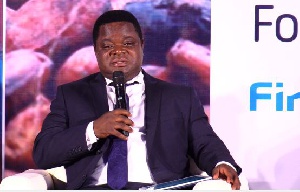At the just-ended Evidence to Action Conference and Exhibition 2025, held at the Institute of Statistical, Social and Economic Research (ISSER) in Accra, Director Professor Peter Quartey revealed that an MoU with the Ministry of Local Government, Decentralisation and Rural Development is in the offing.
This come on the heels of the strongest calls ever to bridge the gap between research and policy actions and facilitate use of research evidence to guide and assess development policies in Ghana.
He revealed that the Minister of Local Government, Decentralisation and Rural Development, Ahmed Ibrahim, was “amazed at the level of evidence we have gathered” – prompting this decisive action.
According to Professor Quartey, the minister took specific evidence away, left a technical advisor to gather more and initiated plans for a Memorandum of Understanding (MoU) between his ministry and the research bodies.
“He was very frank that he needed us. We are going to work together,” Quartey stated, highlighting the success in forging a direct link between academic research and government. “This conference has created a platform for us to engage. We believe when we set the pace we set an example, other ministries will come along.”
Professor Quartey stressed that this partnership wiill be more about accountability for public funds. “Now we see a lot of money being sent to the ministries, to the assemblies. Who is assessing it? Who is monitoring it?”
He argued that the evidence provided by ISSER and ICED will “set the parameters right so we get a better outcome” by establishing clear baselines and monitoring frameworks.
The CEO of ICED, Dr. David Ameyaw, advocated effective community level engagement, especially with women, young people, people living with disabilities and vulnerable marginalised people, which according to him make up 60-70 percent of the African population.
“If we are able to solicit their opinions and views, it can help us to really come up with policies and actions which really shape life and improve livelihoods,” he emphasised.
Being privy to the evidence is the first step on the path to translating academic research into tangible improvements for governance and development in Ghana, the renowned researcher noted. “Together we’ll build partnerships, we’ll build our country and make it a better place,” Professor Quartey added.
He however insisted that research must move beyond “textbooks” and “long, several-paged documents”. Evidence must be “ready to assimilate, ready to disseminate” in formats digestible for busy officials and the communities themselves. “We’re going to reach out to the communities and share with them,” he said, pledging ISSER’s commitment to making evidence accessible.
However, he urged that policymakers be engaged at the inception of research. According to him, this will provide them a better understanding of the generated evidence to aid in translating it into effective policies.
“We can better transition research into policy when, right at the onset, we engage practitioners, we engage policymakers,” he emphasised, stressing this ensures that research is demand-driven and relevant.
Prof. Quartey said the ISSER-ICED partnership to host the conference is strategically vital. He noted that ISSER’s annual goal is to host a major international conference and lauded ICED as a “solid institution” with extensive African networks.
“The two of us partnering enhances our image and sells Ghana as a country to the global community,” he declared, underscoring the role of such collaborations in elevating Ghana’s research and policy influence.
The closing remarks by Dr. Namanga Ngongi, ICED Board Chair – thanking the government of Ghana, particularly the minister and ISSER, for their valuable contributions to the conference’s success – reinforced Prof. Quartey’s points.
Dr. Ngongi outlined key action areas, including deepening participatory governance, institutionalising evidence translation mechanisms and reclaiming the ownership of African development.
The theme for this year’s conference is ‘Advancing Participatory Governance for Sustainable Development in Africa’. The Evidence to Action Conference and Exhibition 2025 was hosted in Accra from July 14 to July 18, 2025.
It assembled more than 400 delegates from 29 African countries to forge practical strategies for putting the citizens, especially youth, at the heart of decision-making and be able to translate research evidence into viable development policies. These included experts, activists, policymakers, civil actors, development partners and innovators.



